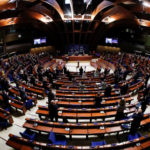In order to support Kosovo’s efforts for membership in the Council of Europe, the Western countries imposed a condition on it: the undertaking of concrete steps for the establishment of the Association of municipalities with a Serbian majority.
This was confirmed by the German Embassy in Kosovo. “Submitting the draft statute [of the Association] to the Constitutional Court for review would be such a [concrete] step,” says the German Embassy’s response to REL.
The Prime Minister of Kosovo, Albin Kurti, rejected this condition, on the grounds that it has nothing to do with the country’s admission to the Council of Europe. Speaking at a meeting of his Government on Wednesday, he said that the issue of the Association is related to the dialogue for the normalization of relations with Serbia.
On Wednesday, the US special envoy for the Western Balkans, Gabriel Escobar, said in an online meeting with journalists that there are concerns that Kosovo may not have the votes to be admitted to the Council of Europe. He said that several member countries of the Council of Europe have asked Kosovo to establish the Association and added that this is a constant request of the international community.
Bodo Weber, senior associate of the non-governmental Council for Democratization Policies in Berlin, believes that the issue of Kosovo’s membership in the Council of Europe will not be on the agenda of the meeting of the Committee of Foreign Ministers on May 16 and 17, when the final decision on the admission of Kosovo was also expected.
“This would prevent a negative vote, that is, an unsuccessful vote,” says Weber. For Kosovo to become a member of the Council of Europe – the continent’s largest organization for human rights – its acceptance must be supported by at least two-thirds of the 46 member countries.
Kurti said on Wednesday that his Government will not send the Association’s draft statute to the Constitutional Court for review, because it is part of the dialogue with Serbia that takes place in Brussels and not in Strasbourg, where the Council of Europe is headquartered. He justified his decision with the fact that Serbia has refused to sign the Agreement on the path to the normalization of relations, which the two countries have accepted in 2023.
The European Union, as mediator of the dialogue, has previously said that the agreement, which has become known publicly as the Ohrid Agreement, is legally binding for both Pristina and Belgrade, even though it has not been signed. Kurti, speaking after a meeting with representatives of foreign embassies in Pristina, on May 6, said that the process of normalizing relations with Serbia should not be mixed with the issue of Kosovo’s membership in the Council of Europe.
According to him, Kosovo has fulfilled all the conditions for membership in the Council of Europe and the imposition of new conditions is contrary to the April 16 vote. On April 16, the deputies of the Parliamentary Assembly of the Council of Europe have approved with a majority of votes the report of the Greek deputy, Dora Bakoyannis, which recommends to the Committee of Foreign Ministers of the Council of Europe to accept Kosovo’s request for membership in this organization.
Radio Evropa e Lire addressed the Presidency of Kosovo and the Ministry of Foreign Affairs regarding the new condition of the Western countries for Kosovo’s membership in the Council of Europe, but did not receive a response.
Weber says that Kosovo “fell” in the informal conditions of Western countries, as far as membership in the Council of Europe is concerned, and adds that such political demands towards the official Pristina could be expected. He adds that Western countries submitted these informal requests quite late. “We have a combination of self-deception from Prishtina and delayed signals from the most important representatives of the European Union,” says Weber.
According to him, the new situation can damage the political dialogue between Kosovo and Serbia and shows that the Ohrid Agreement has not relaxed the relations between the parties at all. The responsibility, he adds, falls on Western countries. “There is a complete blockade, a hardening of relations between Belgrade and Pristina, Pristina and Kosovo Serbs, as well as Pristina and the West,” says Weber.
Kosovo has applied for membership in the Council of Europe in May 2022. On March 27, the Committee for Political Affairs and Democracy of the Council of Europe approved the report of Dora Bakoyannis, rapporteur of the Parliamentary Assembly of the Council of Europe for Kosovo.
The positive report was preceded by the decision of the Government of Kosovo to return 24 hectares of land and forests to the Monastery of Deçan, based on a decision of the Constitutional Court of Kosovo, which for years it has refused to implement. As for the Association of Serb-majority municipalities, Bakoyannis’ report states that it is an internal issue of Kosovo.
Serbia, on the other hand, has formed a working group for the coordination of the activities of the state authorities against the admission of Kosovo to the Council of Europe. The new Prime Minister of Serbia, Miloš Vučević, has also said that he will do everything to prevent Kosovo’s admission to the Council of Europe, even though, as he stated, the chances are small.
The Council of Europe was founded in 1949. It protects freedom of expression and the media, equality and minorities in member countries. One of the direct benefits of Kosovo’s citizens from eventual membership in the Council of Europe would be access to the European Court of Human Rights in Strasbourg. /REL/







